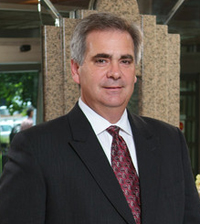How far will the Federal Trade Commission (FTC) go to achieve a ban on so-called reverse-payment patent settlements between generic and branded drug firms?
The agency, which has been quite vocal in its opposition to such settlements but has failed to muffle them via the courts or healthcare reform legislation, is now trying some new tactics: harassment, use of privileged information and attempting to force a pharma company to partner with another firm against its will.
That’s what the CEO of Watson Pharmaceuticals claims in a brief he filed last Friday against the FTC after the agency sought to have him testify in an ongoing case. Watson CEO Paul Bisaro says the agency is attempting to override a reverse-payment settlement his firm made with Cephalon by seeking to broker a business deal between Watson and generics maker Apotex that would “engineer” the market entry of cheaper copies of a popular Cephalon sleep apnea drug, Provigil (modafinil).
Apotex is known for having mounted an at-risk launch of the Bristol-Myers Squibb/Sanofi-Aventis blood thinner Plavix four years ago, after the firms had failed to come to terms on Apotex’s patent challenge. Apotex may have to pay as much as $442 million in damages from the Plavix case. Apotex also learned last August that the FDA had put two of its manufacturing sites under “import alert,” meaning drugs manufactured at both are denied US entry.
As Watson mulls its options, the FTC has also threatened to reopen an investigation of the firm and has subpoenaed Bisaro, even though he was not the primary decision maker in this matter. Bisaro was not even employed by Watson when the settlement transpired, and the FTC has already spoken to Watson’s chief legal counsel.
FTC’s pursuit of the subpoena “is nothing short of harassment,” meant to pressure Watson to enter into a business relationship with Apotex and/or retaliate against Watson for failing to do so, asserts the brief. “At this point, respondent and Watson have had enough and respectfully request that the court deny the petition.”
Publicly accessible court papers in the suit, listed on the Washington, DC, docket as case no. 1:10-mc-00289, also document a conversation during which an FTC official shared confidential FDA information with Watson’s outside attorney. Watson and Cephalon entered their settlement deal in 2006, allowing Watson’s partner Carlsbad Technology to begin marketing several years prior to the sleep drug’s scheduled patent expiry. Four other generic companies had struck similar Provigil generic marketing deals with Cephalon, prior to Watson’s, on the original patent.
But Watson, it turns out, had first-filer status on a supplemental ANDA it filed in December 2007 on a subsequent patent. Much of that information, per the brief, was confidential, even to Watson. FTC then repeatedly asked Watson to relinquish its purported first-filer rights and apparently provided Watson’s privileged information to Apotex, leveraging correspondence from both companies to try and broker the Watson-Apotex deal that would pave the way for generic competition.
“An [internal Apotex] e-mail also confirmed that the FTC staff and Apotex were in close communication and that the staff was apparently sharing certain of Watson’s statements with Apotex,” according to court papers.
The FTC has been bent on banning, through litigation and/or legislation, what it calls “pay-for-delay” patent litigation settlements between brand-name drug manufacturers and their generic counterparts. But it has failed to notch a win.
A bill sponsored by Sen. Herb Kohl seeking to ban patent settlements did not make it into the House healthcare reform bill passed by the Senate and signed into law last March. And this month, the US Court of Appeals for the Second Circuit held that “pay-for-delay” settlements to resolve a brand name drug manufacturer’s patent infringement action against a generic drug maker are not an antitrust violation, although the court invited the appellants to petition for a rehearing.
But if, through the tactics outlined in FTC v. Bisaro, the agency were to prevail, it could have wide-ranging implications for biopharma innovation, patents and brands.
If a government agency, like the FTC, is allowed to dictate business decisions, innovation could suffer, some say. A ban on reverse-payment patent settlements will make mid-size and biotech firms targets for generic launches at-risk, because they are least likely to afford multi-year litigation, said Aaron Berg, COO of Essentialis, a venture-backed pharma company.
That could put a chill on private equity investment, said Berg. “If suddenly the sector is more risky and others seem less risky, [VC firms] redirect money elsewhere; there is less capital. So this whole concept of what Kohl and the FTC want to do doesn’t take into account how innovation investment is considered.”
Berg foresees FTC’s new tack—especially nudging companies into joint ventures—as “a danger to intellectual property rights.”
He adds that FTC’s efforts to ban reverse-payment settlements are misguided. “When settlement is taken off the table, the parties’ only option is to litigate to the end,” Berg explained. “That’s costly for the companies and the public. As the BMS-Apotex case showed, when BMS sued to enjoin Apotex and won, instead of coming to the market as a generic months earlier, the court enforced Plavix’s full patent life. That hurts, not helps, the health-system wallet.”
As for the subpoena of Bisaro, one Washington legal expert said courts are loathe to bother CEOs by asking them to testify. Nevertheless, industry watchers will be wondering not only whether Bisaro’s petition is accepted or denied, but also whether FTC’s actions will now come under scrutiny as well.








